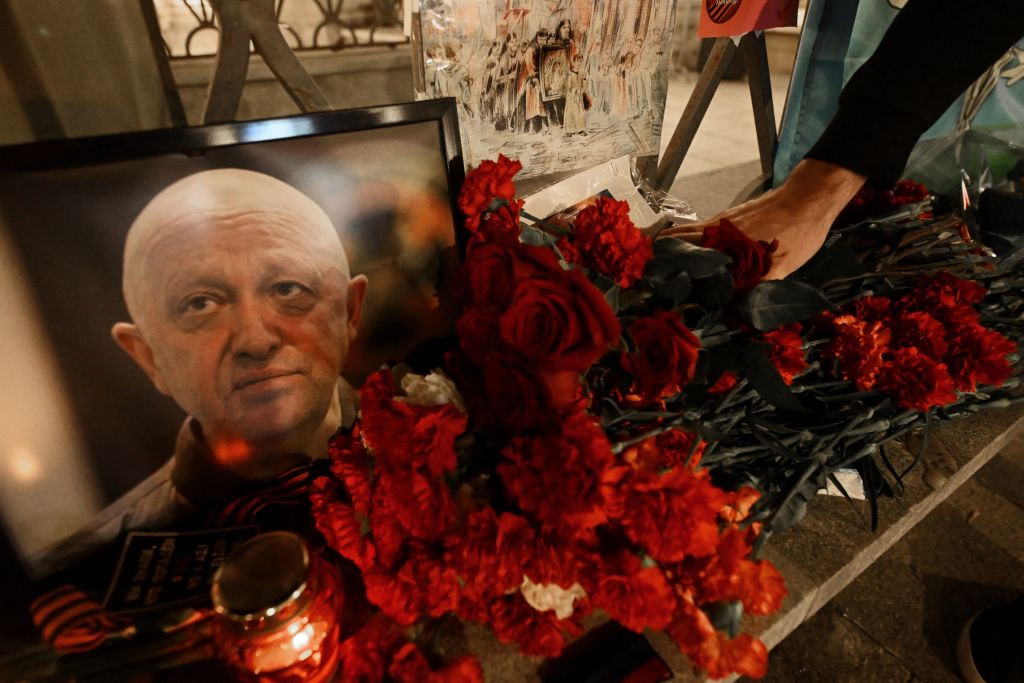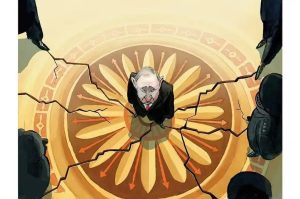Sunday was the one-year anniversary of Yevgeny Prigozhin’s mutiny, when his Wagner mercenaries seized the city of Rostov-on-Don and sent a flying column of several men towards Moscow. You would scarcely know it, though, because while Russian social media is full of discussion, eulogies and conspiracy theories, the state-controlled press is largely pretending this never happened.
The closest thing to a recognition of the anniversary has been the arrest on extortion charges of two senior figures from Prigozhin’s media — and trolling — arm. One, Ilya Gorbunov, seems to have been the coordinator of the media coverage of the Wagner “march of justice,” who even tried to organize street protests in support of what was really a heavy-handed attempt to induce Vladimir Putin to abandon his erstwhile defense minister, Sergei Shoigu, and continue to allow Prigozhin to run Wagner as his own private army.
Prigozhin the trollmaster and mercenary impresario may be dead, but Prigozhin the myth is arguably stronger than ever
Otherwise, this is an official non-event, even though there was a heavy National Guard presence at St. Peterburg’s Porokhovskoye cemetery, where Prigozhin’s grave has become a shrine for a growing body of nationalist critics of the regime, who smother it in flowers and even hammers, a distasteful reminder of how the sledgehammer became a symbol of Wagner when a defector from its ranks was murdered with one.
On the anniversary of Prigozhin’s birthday on June 1, when cemetery workers were clearing away the flowers, they found a card reading: “Prigozhin is alive. We will take revenge.” The most recent such note simply promised (or warned): “I’ll be back.”
What is striking is the degree to which there are people willing to believe such pranks or stunts. There have been various alleged sightings: amid a collection of Wagner trainers in Chad in May; laying flowers at a memorial in the Central African Republic; stepping through a school assembly in Tyumen in September. Glimpses of heavy-set bald men — not exactly a rarity in Russia — are enough to launch a new wave of conspiracy theories: when his plane crashed exactly two months after his mutiny, he had actually been replaced with a body double; the DNA tests which confirmed his corpse’s identity were spoofed; there was a second plane. And so on.
Indeed, another of his former media executives, while claiming that he was “an opponent of all fantasies, speculation and conspiracy theories,” publicly expressed confidence that he was alive simply because “working with Prigozhin, I quickly got used to not being surprised by anything.”
Hardly convincing, not least because of what has happened to Prigozhin’s empire. Wagner is no more, its African ventures rolled into the new Africa Corps — Moscow seems to have overlooked the unfortunate historical ironies of this name — and the rest of its forces now forced into the regular military or the National Guard. His troll farms have been taken over by various business rivals or the intelligence services, and without his patronage and insider connections, his “Concord” business empire is in crisis. The bulk ended up bequeathed to his son, Pavel, but this proved something of a poisoned chalice: in the last year its losses amounted to something like a billion rubles ($11.5 million).
Prigozhin the entrepreneur, trollmaster and mercenary impresario may be dead, but Prigozhin the myth is arguably stronger than ever. As political strategist Abbas Gallyamov put it: “the weaker Putin’s position in this ‘patriotic’ community, the more often Prigozhin’s name will come up precisely because Prigozhin is now perceived… a representative of a more effective and active patriotism, which is aimed at the interests of the Motherland, and not at lining his own pocket.” Of course, Prigozhin did actively line his own pocket, making millions as he threw Wagner mercenaries and recruits from the prison camps into the meat-grinder like human ammunition.
The myth and memory of Prigozhin is of a patriot and man of the people, willing to tell it like it is and to roll up his sleeves and do what needs to be done without fear or favor. One of his former cohorts, whom Anna Arutunyan and I interviewed while working on our book Downfall. Prigozhin, Putin and the New Fight for Russia’s Future, was spot on when he predicted — shortly after his death — that the Kremlin “might end up regretting killing him. You can expose and undermine a man much more easily” than a legend.
Putin’s regime is stable, secure — but brittle. The mutiny highlighted just how badly it could respond to a crisis, with Putin disappearing from view and then in his desperation to make this crisis go away making too generous a deal with Prigozhin such that he felt he had murderously to rescind it. The security forces largely looked on, unwilling to side with Wagner, but no more keen to intervene to stop the so-called “March of Justice.”
The Prigozhin myth, with its random “sightings,” the odd messages from beyond the grave, the exaggerated claims as to what he could have accomplished — What Would Prigozhin Do? — are less about him, so much as outlets for frustration and a sense of betrayal from the very nationalists Putin had hoped to co-opt. In the chaotic Time of Troubles that followed the death of Ivan the Terrible, no fewer than three “False Dmitries” arose claiming to be his son and heir, who had actually died years earlier. Many flocked to their banner, sometimes cynically, but often simply hoping that they had found a savior. All those blurred videos on social media are, in their own way, signs of the “False Yevgeny.”
This article was originally published on The Spectator’s UK website.


























Leave a Reply